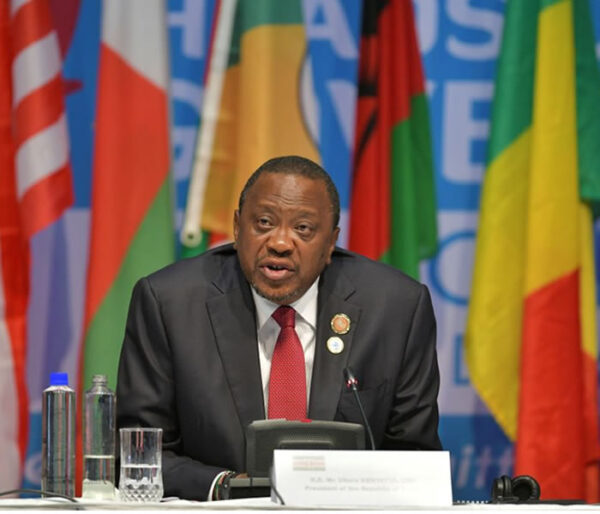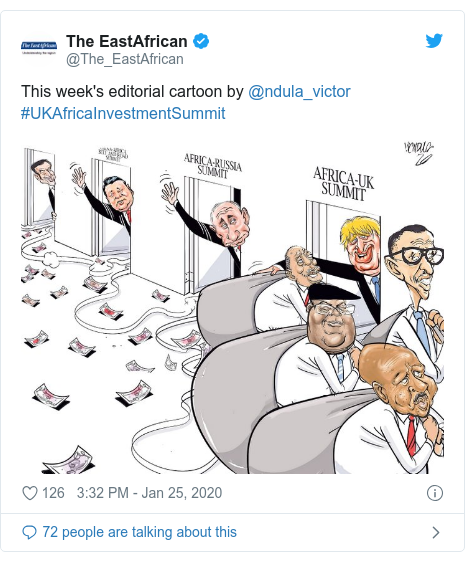How Africa hopes to gain from the ‘new scramble’
How Africa hopes to gain from the ‘new scramble’Major world powers are jostling for political and economic influence in Africa, but what is behind the renewed interest on the continent and what are African countries doing about it? The BBC’s Dickens Olewe reports. In recent years Africans have become used to seeing their leaders accumulate air miles while honouring invitations to attend a series of Africa-themed summits held around the world, often advertised as win-win partnerships.
Last year, Japan, Russia and China hosted African presidents and heads of government; last month 15 African leaders attended the UK-Africa Investment Summit in London, and invitations have probably already been sent for similar events reportedly planned in France, Saudi Arabia and Turkey this year
What’s the interest? A mixture of the continent’s rich mineral resources, unexploited agricultural land, its influential 54 votes at the UN, stemming a growing threat of Islamist militancy, economic immigration, and anxiety, some say racist, about its burgeoning population, are among the issues behind this renewed interest. Africa is more than just a continent producing security threats or unregulated migration that must be contained” Uhuru Kenyatta President of Kenya “The world needs to engage and help solve Africa’s problems, which, sooner rather than later, will become global problems,” Zambian economist Dr Dambisa Moyo argued in her 2018 article titled: Africa Threat. “There has never been a greater need for constructive international engagement on the continent. Besides, the global economy could reap significant rewards from positive engagement,” Dr Moyo wrote. Kenya’s President Uhuru Kenyatta agrees, saying during a recent visit to the US that Africa is “more than just a continent producing security threats or unregulated migration that must be contained,” but that it offers investment opportunities to the world. However, he warned against the frenzied contest between China, US, Russia, and other countries: “I have noticed conversations in Western countries and their counterparts in Asia and the Middle East have returned to competition over Africa, in some cases… behaving like Africa is for the taking… Well I want to tell you it is not,” Mr Kenyatta added


But does Africa have a plan? In 2013, African leaders, under the African Union (AU), agreed on a blueprint to tackle the myriad challenges the continent faces. The plan was dubbed Agenda 2063. It sets out a vision, among others, to end wars on the continent, develop infrastructure, and allow freedom of movement on the continent. Another flagship project, the African Continental Free Trade Area (AfCTA), the world’s largest free trade pact in terms of countries involved, is projected to improve and boost trade amongst African nations. Critics, however, say that AfCTA, which comes into effect in July, is not a panacea and faces big hurdles, especially protectionism policies and poor transport infrastructure in member states. Flagship projects of Agenda 2063 Connect all African capitals and commercial centres through high speed train network Accelerate intra-African trade and boost Africa’s trading position in the global market place The development of the Inga Dam in DR Congo to generate 43,200 MW of power Remove restrictions on Africans ability to travel, work and live within their own continent Ending all wars, civil conflicts, gender-based violence, violent conflicts and preventing genocide Establishment of a single African air-transport market (Saatm) Strengthen Africa’s space industry Create an African virtual and e-university Develop an encyclopaedia Africana to provide an authoritative resource on the authentic history of Africa and African life Source: Agenda 2063 However, the AU is struggling to implement Agenda 2063 because the organisation lacks the carrot-and-stick influence to corral member countries to focus on the agreed plans, W Gyude Moore, a former minister of public works in Liberia, says. He argues that with many African countries increasingly saddled with debt and using their resources to pay off foreign loans, they have been distracted from the grand continental plan.